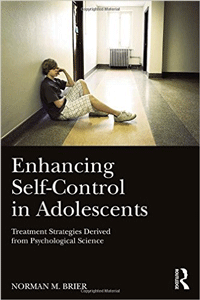“Enhancing Self-Control in Adolescents: Treatment Strategies Derived from Psychological Science”

“Enhancing Self-Control in Adolescents: Treatment Strategies Derived from Psychological Science”
By Norman M. Brier
Routledge
New York, N.Y., 2015
Book addresses common therapeutic goal
Reviewed by James K. Luiselli, Ed.D., ABPP, BCBA-D
This book presents a trans-diagnostic approach to enhancing self-control in adolescents. Psychologist Norman M. Brier starts with a precis of typical adolescent characteristics that dictate the need for efficient self-regulation: impulsiveness, a tendency toward risk-taking behavior and the pursuit of immediate gratification. Difficulty with self-control, in turn, is regularly associated with poor decision making and potentially unhealthy life choices.
Brier’s conceptual framework is rooted in social and personality psychology. The key elements of his treatise are understanding the “causal mechanisms” that contribute to impaired self-control and recognizing how achieving better self-control will appeal to adolescents.
His trans-diagnostic approach signifies that the psychological intervention techniques outlined in the book can be applied effectively across many disorders and clinical conditions.
Self-control, as Brier describes, is “a youngster’s ability to actively and intentionally modulate, limit, delay and/or inhibit emotional arousal, thoughts or behavior in order to obtain a greater, delayed reward rather than a smaller, immediate reward.”
This description is consistent with contemporary delay discounting theory as an explanation for impulse-control problems. Gaining self-control, on the most basic level, is achieved by overcoming the urgency of immediate, diminished “pay offs” in favor of larger but more distant pleasurable consequences.
Brier writes persuasively about the influence of pre-pubertal development and brain maturation on self-control. In effect, adolescent neurobiology contributes to novelty-seeking behaviors that produce high-impact and reinforcing sensations.
Insensitivity to these brain-behavior relationships, the book argues, will detract from optimizing psychological interventions for adolescents.
The book lays out a three-pronged methodology for enhancing self-control. Motivational interviewing, an evidence-supported technique, is intended to establish a “collaborative, non-controlling, non-judgmental, and non-confrontational” stance between a clinician and adolescent.
The steps for building such an alliance are illustrated throughout the book and in several case examples.
Brier labels his second phase of intervention as “implementation intentions,” more precisely a set of behavior planning strategies that translate thinking directives into action commitments.
The chief components are setting goals and linking mental events to performance through an “if-then” construction. I found his presentation most compelling and closely aligned with Problem Solving Therapy (PST) and related psychotherapy practices.
Finally, Brier relies heavily on “mental stimulation,” which corresponds to familiar cognitive behavioral techniques such as imagery rehearsal, attention focusing and visualization. Although implicit in his message, he spends less time discussing the process of enacting these cognitive operations. That is, the success of deliberate planning and rehearsal ultimately entails direct actions and empirical evaluation of the effects.
This book is helpful for psychologists and other mental health professionals. Indeed, addressing self-control with adolescents is a common therapeutic goal independent of treatment philosophy.
In addition, acquiring self-regulation competency benefits youth who struggle with different challenges at school and among parents and peers. The book is brief (114 pages) and should be easily accessible to most busy practitioners.
I note that the book does not dwell on methods for assessing self-control deficits, for example, behavior rating scales, continuous performance tests, computer software programs and more recent mobile phone applications.
Newer technology devices might also prompt and promote the self-control skills Brier examines so thoughtfully. Minor criticisms aside, “Enhancing Self-Control in Adolescents” brings a fresh and adaptable perspective to clinical treatment.
James K. Luiselli, Ed.D., ABPP, BCBA-D, is Chief Clinical Officer, Clinical Solutions, Inc. and North East Educational and Developmental Support Center, Tewksbury, Mass..
Learn more about the book: Enhancing Self-Control in Adolescents: Treatment Strategies Derived from Psychological Science
